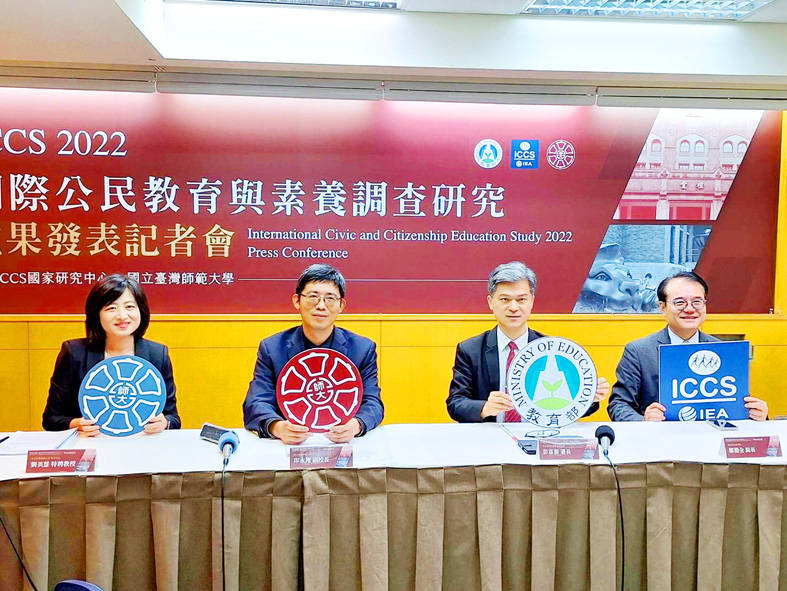《TAIPEI TIMES》 Taiwanese students top civics study

K-12 Education Administration Director-General Peng Fu-yuan, second right, and other academics hold placards at a news conference in Taipei on Tuesday. Photo: CNA
/ Staff writer, with CNA
Taiwanese students ranked first in civics knowledge in last year’s International Civic and Citizenship Education Study (ICCS), the International Association for the Evaluation of Educational Achievement (IEA) said on Tuesday.
The study found that 5,227 eighth-grade students from 159 schools in Taiwan averaged 583 points in civic knowledge, well above the global average score of 508.
Students from 24 countries — mainly in Europe — participated in the study, the ICCS’ third, which “reports on students’ knowledge and understanding of concepts and issues related to civics and citizenship,” the IEA Web site says.
Taiwan has participated in all three studies, the previous ones being in 2009 and 2016.
Taiwan had a higher score and ranking in civics knowledge than in previous surveys, said National Taiwan Normal University (NTNU) professor Liu Mei-hui (劉美慧), who headed the nation’s participation in the study.
In 2009, Taiwan ranked fourth in civics knowledge with an average score of 559, trailing Finland, Denmark and South Korea, and it ranked second in 2016 behind Denmark with an average score of 581.
The civics questions focus on a broad range of subjects that test knowledge of citizenship and students’ ability to apply it to real-world contexts.
The report included sample questions, which asked why people would join a political party, the appropriateness of a police officer’s actions, how to combat false news reports and purchases an ethical consumer might make.
The study also measured students’ civic engagement and their attitudes toward important issues in society, and how civics and citizen education was being carried out in their countries.
In the attitude and engagement parts of the study, Taiwanese students showed the highest support for gender equality, equal rights for all ethnic and racial groups, immigrants’ rights and environmental protection, Liu said.
Taiwanese students also had a much higher level of trust in government agencies compared with people in other countries, while their engagement on political or social issues using digital media was similar to the average, she said.
Taiwanese students’ high scores might be due to civics being a subject in schools, which allows the systematic teaching of civics literacy, while elsewhere, civics education is integrated into other subjects, she said.
The report said that a relatively high percentage of Taiwanese respondents have participated in civics-related activities at school, but the rate of Taiwanese students who took part in community organizations was lower than the global average, she said.
Despite the results, schools could use resources from society, research institutes and civic organizations to provide more opportunities for students to apply their civics knowledge, the NTNU team said.
新聞來源:TAIPEI TIMES

















